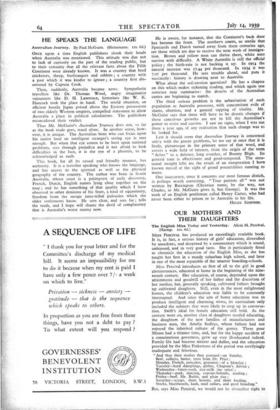HE SPEAKS THE LANGUAGE
Australian Journey. By Paul McGuire. (Heinemann. 12s. 6d.)
ONCE upon a time English publishers shook their heads when Australia was mentioned. This attitude was due not to lack of curiosity on the part of the reading public, but to their certainty that all the relevant facts about the Fifth Continent were already known. It was a country that bred cricketers, sheep, bushrangers and rabbits ; a country with a past which it was kinder to ignore ; a country first dis- covered by Captain Cook.
Then, suddenly, Australia became news. Sympathetic travellers like Dr. Thomas Wood, angry imaginative sojourners like D. H. Lawrence, historians like W. K. Hancock took the place in hand. The world situation, an efficient hostile Japan poised above the Eastern possessions of two elderly Western empires, compelled statesmen to allow Australia a place in political calculations. The publishers reconsidered their verdict.
Thus Mr. McGuire's Australian Journey does not, so far as the book trade goes, stand alone. In another sense, how- ever, it is unique. The Australian born who can focus upon his native land an intelligent stranger's seeing eye is rare enough. But when that eye comes to be bent upon national problems, sees through prejudice and is not afraid to look difficulties in the face, it is the eye of a phoenix, to be acknowledged as such.
This book, for all its casual and friendly manner, has authority. It is a traveller speaking who knows the language, and has access to the spiritual as well as the physical geography of the country. The author was born in South Australia, whose coast is a palimpsest of early discovery, French, Dutch, English names lying close together on the map ; and he has something of that quality which I have observed in other denizens of his State, a kind of equanimity, freedom from the savage inter-tribal jealousies which the older settlements know. He sees clear, and sees far ; tells the truth, and I hope will shame the devil of complacency that is Australia's worst enemy now. He is aware, for instance, that the Continent's back door has become the front. The northern coasts, so sterile that Spaniards and Dutch turned away from them centuries ago, are those which are due to receive the next wash of immigra- tion. Brown and yellow men can thrive there, white men survive with difficulty. A White Australia is still the official policy ; the birth-rate is not backing it up. In 1914 the natural increase was 17.44 per thousand. In 1934 it was 7.07 per thousand. He sees trouble ahead, and puts it succinctly : history is drawing near to Australia.
What about the soil-erosion question? He has a chapter on this which makes sickening reading, and which again one sentence may summarise: the deserts of the Australian centre are beginning to march.
The third serious problem is the urbanisation of such population as Australia possesses, with concomitant evils of slums, abortion, and a general sapping of vitality. Mr. McGuire says that there will have to be drastic changes if these cancerous growths are not to kill the Australian's power to resist and survive. I saw no signs, when I was out there a year ago, of any realisation that such change was to be looked for.
Lest it should seem that Australian Journey is concerned sole:y with the graver problems, let me say at once that it is lively, picturesque in the primary sense of that word, and covers a wide field of interest, from the origin of the term " Ashes " to a defence, long overdue, of Bounty Bligh. Its general tone is affectionate and good-tempered. The occa- sional straight lefts are the result of an exasperation I have known myseif at the sight of grand potentialities running to waste.
One inaccuracy, since it concerns our most famous distich, is perhaps worth correcting. " True patriots all " was not written by Barrington (Christian name, by the way, not Charles, as Mr. McGuire gives it, but George). It was the work of an English gentleman called Henry Carter, who had never been either to prison or to Australia in his life.
HELEN SIMPSON.










































 Previous page
Previous page